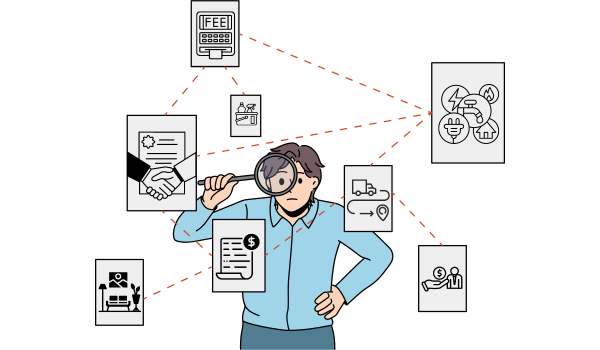Affording your first apartment is a thrilling step towards independence, but it can also be financially daunting. However, with a well-crafted budget and some savvy financial planning, your first apartment can be a launchpad for a secure and fulfilling future. This guide will give you the knowledge and tools to navigate the exciting, yet sometimes complex, world of apartment living.

Getting Started with Budgeting for Apartment Expenses
Assessing Your Financial Situation
Before diving into the details of apartment expenses, it's crucial to assess your financial situation. Start by calculating your monthly income. This figure will serve as the foundation for determining what you can afford.
Next, list all your current monthly expenses, such as car payments, student loans, groceries, and entertainment. Subtract these expenses from your monthly income to see how much you have left for rent and other apartment-related costs.
Setting a Realistic Savings Goal
Having a savings goal is essential when planning to move into your first apartment. Ideally, you should aim to save at least three months' worth of living expenses before making the move. This safety net will help you cover unexpected costs and provide financial stability during the transition.
Start by setting aside a portion of your income each month into a dedicated savings account. Automating this process can make saving easier and ensure you reach your goal in a timely manner.

Essential Tips for Budgeting for Apartment Living
Living on your own requires a shift from relying on family finances to managing your own. Here are some key strategies:
Identifying and Reducing Unnecessary Expenses
Scrutinize your spending habits. Are there subscriptions you don't use? Can you brown-bag lunch instead of eating out? Identifying and trimming unnecessary expenses frees up funds for your apartment needs. Here are a couple of areas to consider:
- Pack Your Lunch: Eating out for lunch can be a significant expense. A typical lunch can cost you between $8-10 dollars. At 7 meals per week, that's about $70. Per year, that translates to a whopping $3,640! Consider preparing your lunch at home. It's healthier and significantly cheaper.
- Cut the Cable Cord: The average cable bill is $65 per month or a staggering $780 per year. That could buy a lot of groceries or other necessities. Explore alternative entertainment options. Many libraries offer free streaming services or allow you to borrow DVDs and Blu-rays. You can also subscribe to specific streaming platforms instead of a bulky cable package.
- Reduce Your Energy Bill: Every dollar saved adds up! Here are some ways to keep your energy consumption, and consequently your utility bill, under control:
- Adjust your thermostat. During the winter, try lowering your thermostat by 10-15 degrees at night. Similarly, in the summer, raise it a few degrees when you're not home. Small adjustments can make a big difference in your energy usage.
- Power down the electronics. Don't leave electronics like gaming consoles or TVs on standby mode when not in use. Turn them off completely to avoid phantom energy drain.
Importance of Creating a Budget Plan
Creating a budget plan is a critical step in managing your finances effectively. Use the 50/30/20 rule as a guideline:
- 50% of your after-tax income should be spent on needs, such as rent, insurance, groceries, and utilities.
- 30% for wants, like dining out and entertainment.
- 20% for savings, including your 401(k) and an emergency fund.
A budget plan helps you track your spending, ensure you don't overspend, and allows you to adjust your financial habits as needed.

Understanding Apartment Costs and Hidden Fees
Rent and Security Deposit
One of the most significant expenses you'll encounter is rent. Find an apartment that costs between 25-35% of your gross monthly income. This range ensures that you can afford rent without compromising other essential expenses.
Additionally, factor in a security deposit, which is typically one month's rent. The landlord holds this money until you move out. If you leave the place in good shape, you’ll get the money back. However, if there are damages or unpaid rent, the landlord may deduct these costs from your deposit.
Utilities and Additional Monthly Expenses
Utilities are another essential part of your monthly budget. These can include electricity, water, gas, internet, and trash services. Some apartments include certain utilities in the rent, while others require you to pay them separately. Make sure to clarify this with your landlord before signing the lease.
Other monthly expenses to consider include renter's insurance, parking fees, and pet fees if applicable. Including these costs in your budget will give you a clearer picture of your total monthly expenses.
One-Time Move-In Costs
Moving into a new apartment comes with several one-time costs. These can include:
- Moving expenses: Hiring movers or renting a moving truck.
- Furniture and household items: Start with the basics, like a bed, shower curtain, and kitchen essentials. Check thrift shops and online marketplaces for affordable options.
- Cleaning supplies and toiletries: These small items can add up quickly, so budget for them accordingly.
Being prepared for these costs can help you avoid financial surprises during your move.

Strategies to Save Money on Apartment Living
Here are some smart ways to stretch your budget when it comes to apartment living:
Choosing the Right Location
The location of your apartment can significantly impact your budget. While living in the city center may be convenient, it often comes with higher rent prices. Consider looking for apartments in surrounding neighborhoods or areas with good public transportation options. This can help you find more affordable rent without sacrificing convenience.
Sharing Costs with Roommates
If you find a place that is a bit more than you can comfortably afford, consider getting a roommate. Sharing an apartment can significantly reduce your monthly expenses. Make sure to choose a roommate who is reliable and responsible for paying their portion of the rent and utilities.
Living with roommates can also make it easier to split other costs, such as groceries and household supplies, further easing the financial burden.
Financial Assistance and Emergency Resources
Exploring Financial Aid and Grants
If you're a student, see if you qualify for financial aid to help with housing costs. You may be surprised at what resources are available.
Utilizing Community Resources
Some government agencies and non-profit organizations offer rental assistance programs for low-income individuals and families. Research local resources and explore if you qualify for any assistance.
Budgeting for your first apartment might seem overwhelming, but with a little planning and discipline, you can create a comfortable and financially secure living situation. Remember, ATFCU is here to help you navigate your financial journey. We offer a variety of savings accounts and budgeting resources to empower you to take control of your finances. With dedication and smart planning, your first apartment can be the first step towards a bright financial future.
Additional Tips:
- Don't be afraid to negotiate: When it comes to rent, especially in a competitive market, see if there's room for negotiation. Offer to sign a longer lease or pay the security deposit upfront in exchange for a lower rent.
- Maintain good credit: Having good credit can translate to lower security deposits and better loan rates when needed. Pay your bills on time and manage your credit responsibly.

